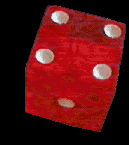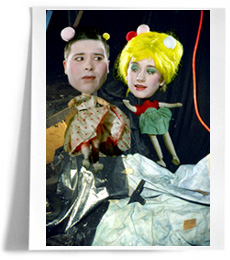





Zoe Beloff works with a variety of cinematic imagery: film, stereoscopic projection performance, interactive media and installation. Her projects are philosophical toys, objects to think with. More and more she finds herself fascinated by phantoms, by images that, "are not there". Zoe’s work has been exhibited internationally. Venues include: The Museum of Modern Art and the Whitney Museum in New York, The New York Film Festival, Rotterdam Film festival, Pacific Film Archives and the Pompidou Center. She was recently awarded a 2003 Guggenheim Fellowship.
You wrote: "There was no predetermined "masterplan". Just some rough ideas in my head, nothing was written down. Rather one line of research lead toanother, one text to another. Movies were improvisedwith what I found at the flea market on Sundaymornings." Is this this improvisation your "modus operandi" as an artist?
Do I improvise?
My projects using found footage are much more improvised since I really don't know what I'm going to find. So I think of creating a kind of dialog with the people I find for example in old home movies. I like this, it pushes me in directions that I might not have thought of. It means that my work is not totally controllable. The movies I find push this in their own directions too, I can't completely control them. Really I'm kind of a scavenger artist, I find all kinds of things, stories, footage, images, sounds. Through the media I find and bring back to life I create a kind of dialog with the past. Do you see yourself as a "cinematic thinker"? Would you call your analogic and digital projects "phylosophical toys"? What role plays philosophy in your work? I guess I am a cinematic thinker, because I use words and images, sound and movement to express my ideas. I could not be a real academic, because writing or criticism is too dry for me, I love graven images too much. I thought once for a brief moment about doing a Ph.D. But I'm too playful... I would hate to have to be historically correct, stuff like that pins you down. I like to make wild connections between different ideas without having to justify myself. Yes philosophical ideas intrigue me. But I never studied philosophy seriously, mostly I've just read stuff on my own. I am intrigued by trying to express abstract ideas graphically in my work. How to represent the unconscious for example. I'm interested in all kind of attempts to do this whether it was a medium conjuring up an apparition at a seance or some kind of educational film or a Betty Boop cartoon. All these attempt are valid to me. Real philosophers would probably wince at my work but maybe they would laugh too, I don't know. In one of my QuickTime movies I represented Henri Bergson as a "conjurer" I thought that was apt. He used the cinematograph as a metaphor. In another of my QuickTime movies I am representing his mental gymnastics as tightrope walking. Actually I admire him a great deal. My father was a real philosopher, like Bergson he is a "dualist" who believes that the mind and the brain are not the same think. I agree, I think of myself more like an "amateur duelist".
Is your work in a certain way an attempt to "reinvent cinema"? I'm not so much trying to reinvent cinema - which is still going strong bu to, perhaps pick up on cinematic ideas , cinematic apparatuses that got dead ended or forgotten. For example I shot "Shadow Land with a stereo Bolex. This was a camera manufactured for a very brief moment in the 1950's so that people could shoot their home movies in 3D. But it never caught on with the public (perhaps because is is really hard to work with). But it does make very beautiful images and I wanted to shoot in 3D to talk about the 19th century fascination with what we might call the "virtual". They were very interested in creating phantom figures that crossed over into the same space as the viewer. (this might be during a seance or during a theatrical performance - ghost shows were very popular where live actors on stage interacted with magic lantern figures projected through glass so that they seemed to hover on stage in the same space as the real performer.) So I thought that the stereo Bolex could be an interesting tool to talk about some of these ideas. Different stories I work on suggest different apparatuses to me. Different stories require different machines to tell them. In conventional cinema the apparatus is hidden. We are supposed to imagine that we are glimpsing life out there on the other side of the screen. But for me the apparatus is also part of the adventure - it certainly is in my favorite philosophical toys. I'm interested in showing how machines work in relation to our imaginations. As you say your on going projects are an investigation of the "relationship between imagination and technology". Can you tell us more about that? You designed the web for the ARAS. Is there any relationship berween technology and the collective unconscious? Oh first off... I did the ARAS site as a job, I needed the money .... I'm not into Jung or archetypal symbolism.
Is this a "real" time machine or more like a kind of nostalgia of a time machine? A "real" time machine? Of course cinema cannot literally transport Us into the past. But when the first reviewer wrote about the first film show by the Lumiere Brothers, he wrote that when these cameras are in the hands of everyone, when cinema will one day show us our loved ones, not only with movement but with color and sound, then death will have ceased to be absolute. So for the early viewers of cinema, it was a device not so much to travel in time but to mechanically resurrect the dead. Similarly when the first listeners heard the phonograph they were shocked, not only was the voice severed from the body but with this machine you could listen to the voices ot those long dead. These ideas really fascinate me. Today people take recorded sound and moving images for granted. I'm interested in bringing their uncanny qualities back to people's attention. Personally I love to listen to very early recordings... to the voices of the dead, they sound so different to us, they do conjure up another world. In my most recent project, I had the actors spend a long of time listening to recordings of people talking from the nineteen teens because people spoke so differently then - its things like this that conventional "constume dramas" overlook. I'm interested in how people understood their world through the media of their time, how they pictured themselves. "To illuminate the present through the past." Do you see time as the central metaphor of your work? To illuminate the present through the past......that is really Really difficult. Walter Benjamin did an incredible job of this....it is something I can perhaps aspire to but never really achieve I think. I did have the idea when I was making Beyond, that people today looked at digital media in such a banal way that perhaps if they were inspired by how the people of the 19th century were transformed and blown away by the birth of mechanical media, then perhaps they would think in a more fantastic way about our new tools. But I'm not so optimistic now. Perhaps some people will find some relevance in my explorations of the past, I don't know. People think virtual reality is a new idea but really it dates back a long way, at least to the phantasmagorias of the end of the 18trh century where apparitions (actually lantern slides) projected onto smoke terrified and enthralled audiences. Natalija A's hallucination of being controlled by a mysterious electrical apparatus....(see my Influencing Machine) still has all kinds of contemporary relevance if that's want one wants to see. But my work is not didactic, I'm not interesting in educating. I'm interested in exploring......I'm interesting in conjuring up. I think of myself a little bit like a medium, an interface between the present and past. In what sense is the body a "desiring machine". Do you see the human body like a kind of projection/incarnation? Do I think the body is a "desiring machine". Well I've read Deleuse but I really don't know. Do I think it is a projection ? I don't think so, a body is just a body, but we "project" ideas all the time. So projection in the cinematic sense can be a rich metaphor. Bergson, Freud, in their different ways used cinema as a metaphor for helping us to think about our conscious and unconscious modes of thought. So I guess I'm using the cinematic apparatus as well as using it also in a metaphorical way. "Turing believed that the mind could be encoded mathematically, that an electric brain was theoretically quite possible, Wittgenstein thought just the opposite." What is your opinion? Can the soul be digitalized? I do believe that we cannot simply be reduced to some physiological apparatuses, some neurological electrical impulses, as I said I'm a "dualist". I believe that there is something called consciousness and that machines cannot have consciousness. So of course I don't go along with Turing. A machine might win a game of chess, but it can't "play" chess in the way we understand this to mean... it has no consciousness of what it is doing. "I've always secretly felt that making these QuickTime movies was more like "casting a spell" that conventionally shooting a film." What (exactly:) did you mean by that? Casting a spell....well very simply when I made my QuickTime movies with my little web cam, I couldn't see what I was doing. I was often standing in front of the camera (for scene where I used rear projection to put myself into the movie) or I was moving objects or texts in front of the camera or I was reading the narration as I was projecting with multiple projectors. So as you can see I was very busy. I would just turn on the web cam and then run around doing all these things kind of blindly. Then I would turn off the camera and look at the results....I never had any helpers, I was running around my tiny apartment at one in the morning don't all these crazy things and narrating at the top of my voice hoping that somehow my ideas would be expressed in an image 120 x 160 pixels and 7 frames per second. It really did feel a bit like casting a spell.
|



